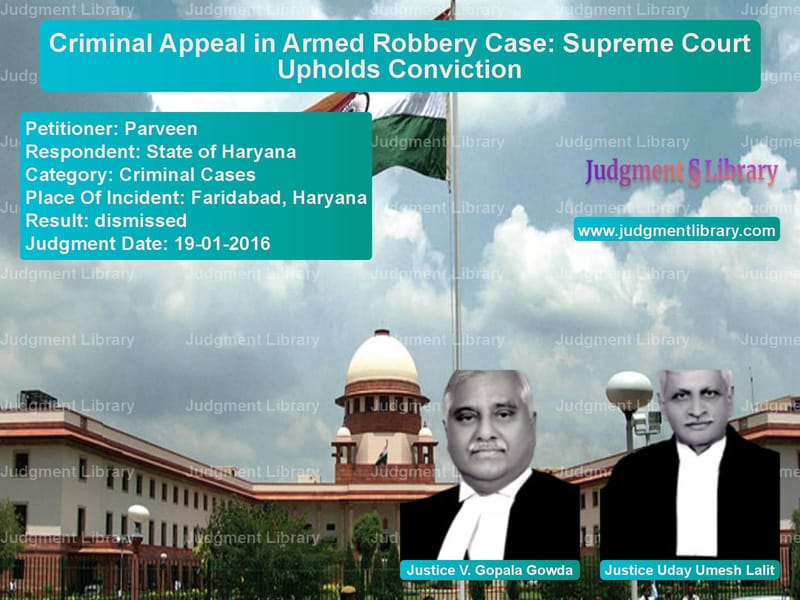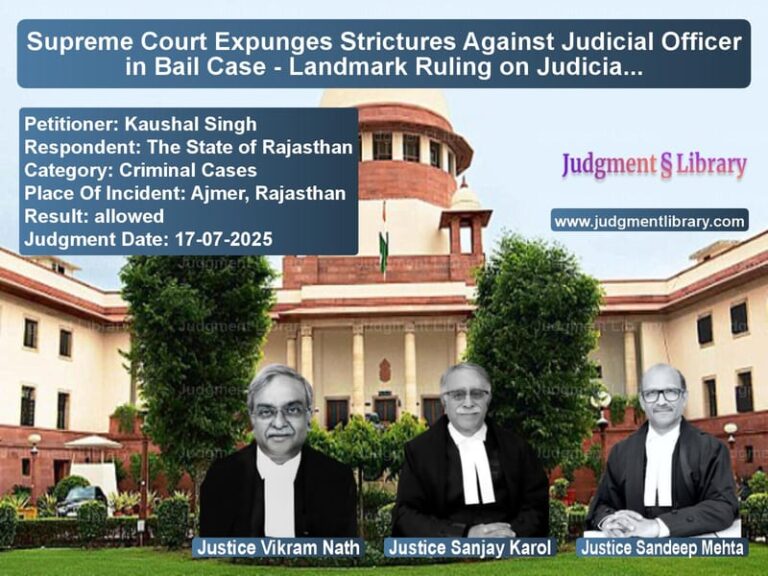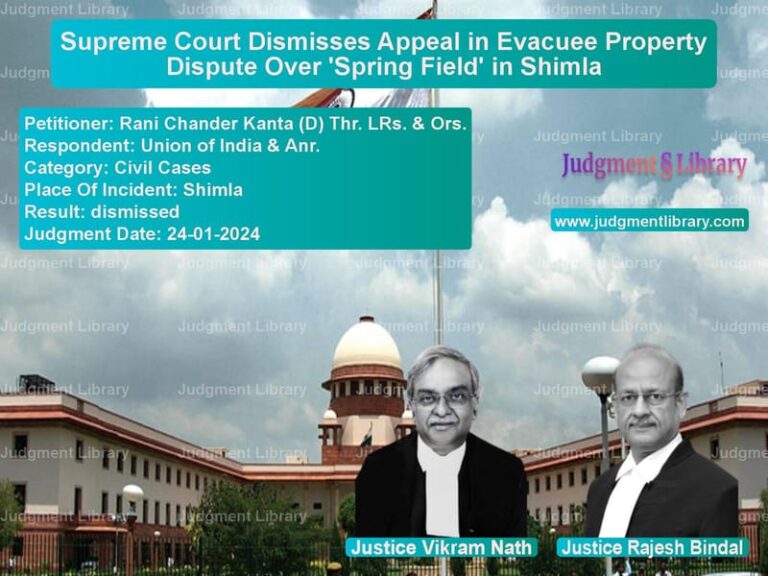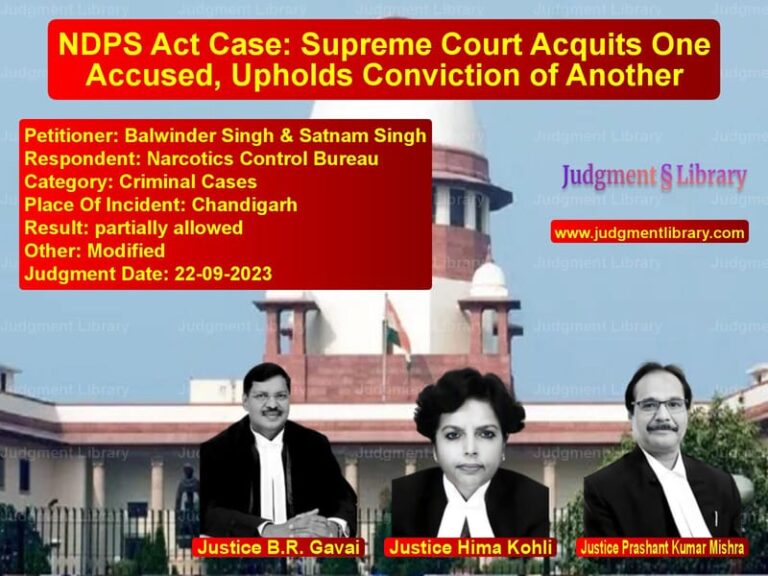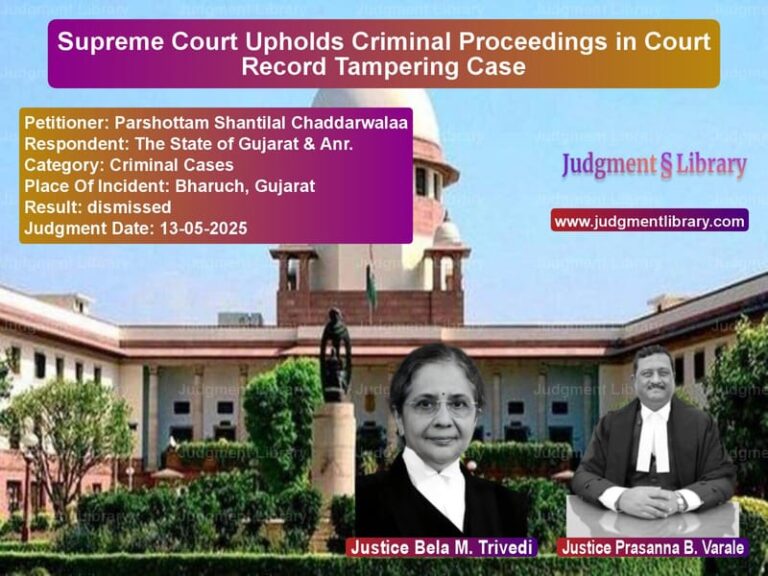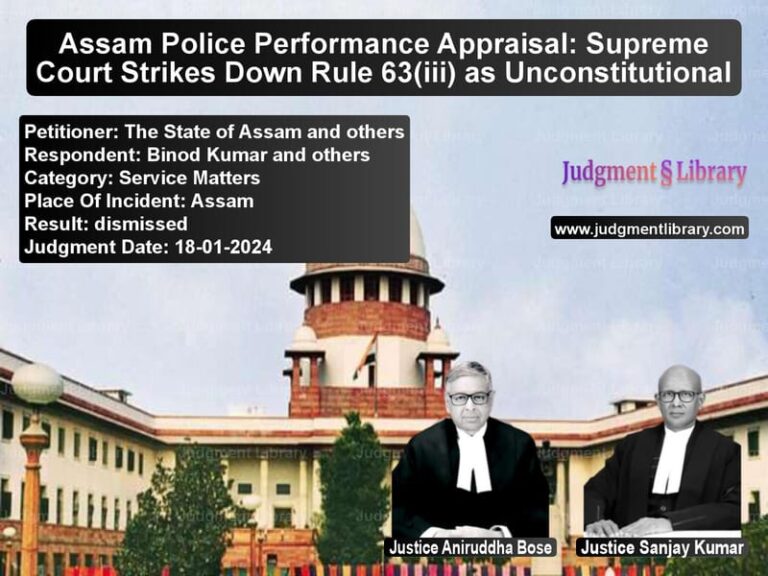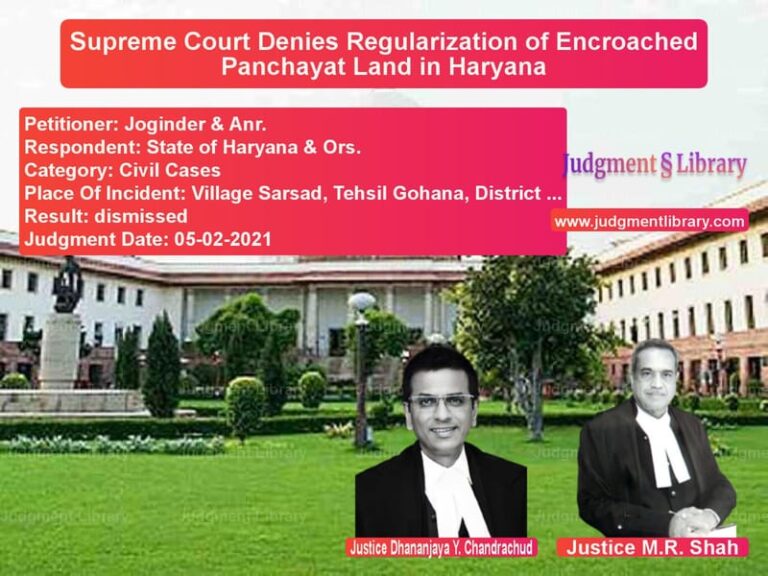Criminal Appeal in Armed Robbery Case: Supreme Court Upholds Conviction
The case of Parveen v. State of Haryana pertains to a criminal appeal arising from the conviction of the appellant under Sections 398 and 401 of the Indian Penal Code (IPC) and Section 25 of the Arms Act. The Supreme Court upheld the conviction and sentence imposed by the Punjab and Haryana High Court, emphasizing the mandatory minimum sentence requirement for armed robbery.
Background of the Case
The case dates back to February 9, 2009, when the police received intelligence that the appellant, Parveen, along with one Jaswant, was planning to loot passing vehicles near Agma Gas Agency Store, located in Sector 21D, Faridabad. Acting on this tip-off, Assistant Sub-Inspector (ASI) Ishwar Singh and Head Constable Yaseen Khan, who were on patrol duty, proceeded to the scene.
Upon reaching the spot, the police observed a white-colored Indigo car parked in a deserted location. The police officers claimed to have seen the accused attempting to stop a Maruti car, which managed to evade them. The police overpowered Parveen and Jaswant and, upon searching them, recovered a knife from Parveen and an iron rod from Jaswant. Additionally, the car was found to contain two number plates, one bearing a Madhya Pradesh registration number.
Charges and Trial Court Verdict
Following their arrest, an investigation revealed that the vehicle in question was stolen property owned by the Life Insurance Corporation (LIC). Neither of the accused could provide a satisfactory explanation for possessing the stolen car. Moreover, both individuals were identified as residents of Gonda, Uttar Pradesh, and not of Faridabad.
The trial court found Parveen and Jaswant guilty and sentenced them as follows:
- Convicted under Section 398 IPC (attempt to commit robbery while armed with a deadly weapon) and sentenced to seven years of rigorous imprisonment.
- Convicted under Section 401 IPC (belonging to a gang of thieves) and sentenced to seven years of rigorous imprisonment.
- Convicted under Section 411 IPC (dishonestly receiving stolen property) and sentenced to one year of rigorous imprisonment.
- Parveen was additionally convicted under Section 25 of the Arms Act (possession of illegal arms) and sentenced to one year of rigorous imprisonment.
Appeal Before the High Court
Parveen and Jaswant challenged their conviction before the Punjab and Haryana High Court, primarily arguing for a reduction in their sentences. They contended that they had already served over three and a half years in custody and that the punishment should be reduced to time already served.
The High Court, however, dismissed their appeal, noting the following:
- The accused were armed with deadly weapons at the time of their arrest.
- They had prior criminal records, with other pending cases registered against them.
- The minimum sentence prescribed under Section 398 IPC is seven years, which the trial court had imposed correctly.
Supreme Court’s Verdict
Parveen further appealed to the Supreme Court, where the only point of consideration was the quantum of sentence. The Court reviewed the case and delivered its judgment on January 19, 2016.
Key Observations by the Supreme Court
- The Court noted that the minimum sentence under Section 398 IPC is seven years and, as such, no further reduction could be granted.
- It observed that the High Court had already evaluated the arguments regarding sentence reduction and had found no mitigating factors that warranted a lesser sentence.
- As per the Court: “The conviction in the instant case is under Sections 398 and 401 of the IPC. Though the sentence under Section 401 can be less than seven years, the sentence under Section 398 shall not be less than seven years.”
- Since the trial court had imposed the minimum sentence mandated by law, the Supreme Court held that no further relief could be granted.
Consequently, the Supreme Court dismissed the appeal, thereby upholding the seven-year imprisonment sentence imposed on Parveen and Jaswant.
Legal Precedents Considered
The Supreme Court referred to previous rulings to justify the mandatory nature of the minimum sentence under Section 398 IPC:
- State of Punjab v. Baldev Singh (1999) 6 SCC 172 – Affirmed that sentencing under specific provisions with minimum punishment must be strictly enforced.
- Jasbir Singh v. State of Punjab (2016) 5 SCC 246 – Held that judicial discretion in sentencing is limited where the law prescribes a minimum punishment.
- Union of India v. Kuldeep Singh (2004) 2 SCC 590 – Reiterated that mitigating circumstances do not override statutory minimum sentences.
Key Takeaways from the Judgment
- Minimum Sentences Are Binding: Courts cannot impose a sentence lower than the statutory minimum prescribed by law.
- Prior Criminal Record Matters: The High Court’s refusal to reduce the sentence factored in the accused’s criminal history.
- Judicial Discretion is Limited in Certain Cases: If the law sets a minimum punishment, courts have little room for leniency.
Impact of the Judgment
The ruling reinforces strict adherence to statutory sentencing provisions in criminal cases:
- For Law Enforcement: Encourages proactive enforcement of laws against armed robbery.
- For the Judiciary: Limits discretion in cases where statutes prescribe a minimum sentence.
- For Criminal Defendants: Highlights the challenges of seeking leniency in cases involving severe offenses.
Conclusion
The Supreme Court’s decision in Parveen v. State of Haryana serves as an important precedent in criminal jurisprudence, underscoring the principle that minimum statutory sentences must be adhered to. By upholding the seven-year imprisonment sentence, the Court reinforced the necessity of maintaining consistency and uniformity in sentencing policies for serious crimes such as armed robbery.
Don’t miss out on the full details! Download the complete judgment in PDF format below and gain valuable insights instantly!
Download Judgment: Parveen vs State of Haryana Supreme Court of India Judgment Dated 19-01-2016.pdf
Direct Downlaod Judgment: Direct downlaod this Judgment
See all petitions in Attempt to Murder Cases
See all petitions in Fraud and Forgery
See all petitions in Theft and Robbery Cases
See all petitions in Judgment by V. Gopala Gowda
See all petitions in Judgment by Uday Umesh Lalit
See all petitions in dismissed
See all petitions in supreme court of India judgments January 2016
See all petitions in 2016 judgments
See all posts in Criminal Cases Category
See all allowed petitions in Criminal Cases Category
See all Dismissed petitions in Criminal Cases Category
See all partially allowed petitions in Criminal Cases Category

